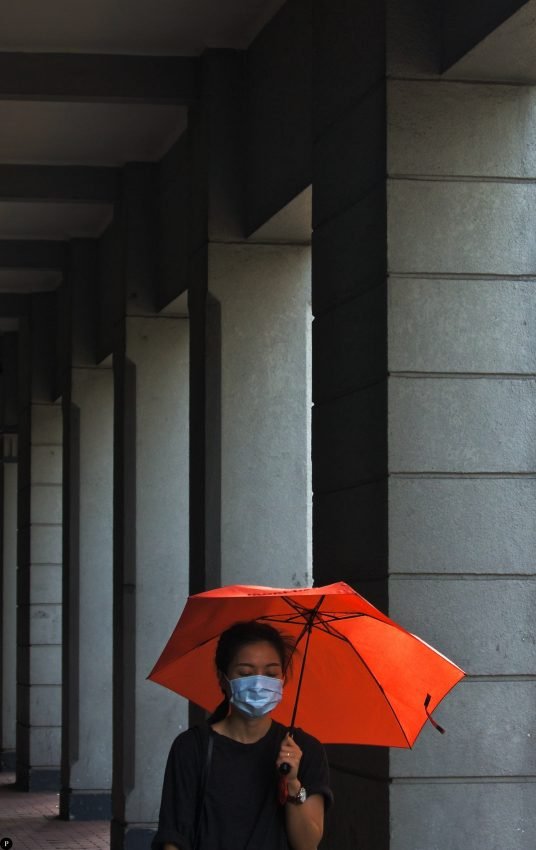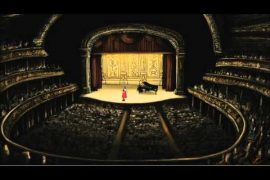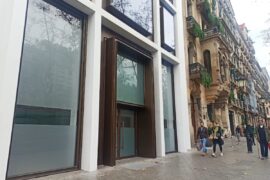[dropcap letter=”C”]
larence Bekker’s life has as many twists and turns as those of his vocal pirouettes and choreographies. The story of this Jamboree’s resident musician, who every Thursday transforms this jazz night club into a true celebration of music, well deserves an in-depth interview. He rubbed shoulders with success with dance music in the early 1990s, with such danceable songs as It’s a loving thing and Send me an angel. Back then, he was known as CB Milton. He was not even 20. A profound and severe crisis led him to Barcelona, where he became a street musician. “I was travelling around the world until on 9/11 (the day of the terrorist attacks on the Twin Towers) I came back to Amsterdam and I realised I was not happy. Discontent and boredom led to drugs. I had money and it was easy for me to get them. But drugs did not bring happiness. Finally, I realised I had to find happiness inside of me. I thought one way of doing it was performing on the streets. So, I came to Barcelona and everything changed. I started finding out who I was. Why I thought, said and felt things. It took me a long time to realise what I had to give up. Today, I think I know who I am. And this is why I am here, celebrating Christmas in Barcelona”.
It was in Barcelona where this Suriname-born Dutch-nationalized artist experienced the transforming power of music at personal and professional level
Celebrating and sharing big time. On Tuesday 18 December he left Teatre Tívoli, carried shoulder-high, with A Christmas Story, the show completing the programme with which music promoter Mas i Mas has been celebrating its silver anniversary hosted in Sala Jamboree.
 It was in Barcelona where this Suriname-born Dutch-nationalized artist experienced the transforming power of music at personal and professional level. Firstly, the 08001 music project, open to all artists from across the world gathering around El Raval district (the name corresponds to its postcode). Later, with Playing for change, as part of this interracial project especially at its budding stage. Subsequently, other renowned artists like Keith Richards, Bono, Manu Chao, Lila Downs, Carlos Vives and Andrés Calamaro joined in.
It was in Barcelona where this Suriname-born Dutch-nationalized artist experienced the transforming power of music at personal and professional level. Firstly, the 08001 music project, open to all artists from across the world gathering around El Raval district (the name corresponds to its postcode). Later, with Playing for change, as part of this interracial project especially at its budding stage. Subsequently, other renowned artists like Keith Richards, Bono, Manu Chao, Lila Downs, Carlos Vives and Andrés Calamaro joined in.
Legend goes that as Clarence was playing in Portal de l’Àngel, an American producer, Mark Johnson, first spoke to him about Playing for change. “I wasn’t getting what he was saying. Little did I suspect then what this would mean to me”, he admits. The fact is that, suddenly, he saw himself singing the classic Stand by me in a squatting site with a mobile recording equipment. “I signed a contract of sorts, but never imagined that would go any further. Two years later, when I had nearly forgotten that, I received in my mail a DVD with the song. ‘It’s fantastic!’, I thought’”. The video has been played over 123 million times.
Johnson called him later and proposed him to go on a tour with the other artists (from Nepal, Africa, Ireland…) who joined in the recording (by listening to their colleagues with their earbuds and adding onto their output). With them, he went on touring around across the globe.
Now, his home is Barcelona, and this is where he lives. Specifically, as could be expected, in the El Raval district. “This reminds of the years when I grew up in Rotterdam, which is Holland’s main port with an immigrant multicultural population (…). Living in the middle of all this cultural diversity makes me feel like home. Happy”
For Clarence Bekker, his participation in Playing for change has been key, other than being a springboard to his career. Because Playing for change is also a foundation supporting the construction of musical schools across the planet. The first one, Ntonga Music School, was inaugurated in 2008 in the Gugulethu district, on the outskirts of Cape Town, in South Africa. Music tears down boundaries and brings peoples closer, regardless of their social and political situation. Musicians connected to each other for the sake of change.
Since his childhood, Bekker has succeeded in turning his songs into release valves. “When I was 11, my father died and we moved to Europe. My widow mother brought me up with five children. We used to move from country to country. And singing helped me escape from certain thoughts and put my mind at ease”. Now, his home is Barcelona, and this is where he lives. Specifically, as could be expected, in the El Raval district. “This reminds of the years when I grew up in Rotterdam, which is Holland’s main port with an immigrant multicultural population. Living in the middle of all this cultural diversity makes me feel like home. Happy”.
Clarence Bekker’s 2 shows, every Thursday at the Jamboree, began in September 2017. And he enjoys them like day one. “What I like is that while I entertain them, the people, they entertain me. It’s like a game”
Clarence Bekker’s music is a natural blend of different styles like soul, funky, reggae, jazz… His repertoire combines versions of easily-recognized classics and music of his own making, turned into classics like Mr. Policeman. We ask him about his relationship with the authority, whether he suffered the abuse he denounces in this song. “Of course -he replies-. Several times and in several ways. I am black, what do you expect? I am always on the first line of crime … And not only me, all my brothers have gone through similar situations. Many times they put me in a police car, took me to the police station and when they checked I had not done anything, they apologized. Same in Barcelona, I was sitting in a corner and, next to me, there was a beer can. A policeman comes along, grabs it, looks at it and asks me whether it’s mine. I said it wasn’t, that it was litter, and he got angry, called for reinforcement and there I was again in a police car…”.
Clarence Bekker’s 2 shows, every Thursday at the Jamboree, began in September 2017. And he enjoys them like day one. “What I like is that while I entertain them, the people, they entertain me. It’s like a game. This is great and it can only happen in such places like this iconic club in Plaça Reial. The audience has always something new to give. New thoughts. I always let them participate actively. When I sing songs from the past and see they know them, there is a feeling of bonding that, even if the song lasts for five minutes, I greatly appreciate it. I am lucky to have this devoted and caring audience. Without them I would be nothing. And they are from all ages, from 1 to 100 years of age. It’s wonderful!”.
“Imagine a life without moving or dancing with someone. It’s like exchanging energies through your body. It’s like sex!”.
Apart from his charisma, his overwhelming energy and his ability to connect, Bekker is a gifted dancer. How, when and who taught you? “My grandma and my mother. They used to tell me: ‘you have to dance’, so I’ve done from an early age. In my family they all are very good dancers. I was saying that to my brother the other day, that he danced very well, and he said very seriously, ‘no, no, I am a deejay [laughter]. I love dancing. Imagine a life without moving or dancing with someone. It’s like exchanging energies through your body. It’s like sex!”.

















